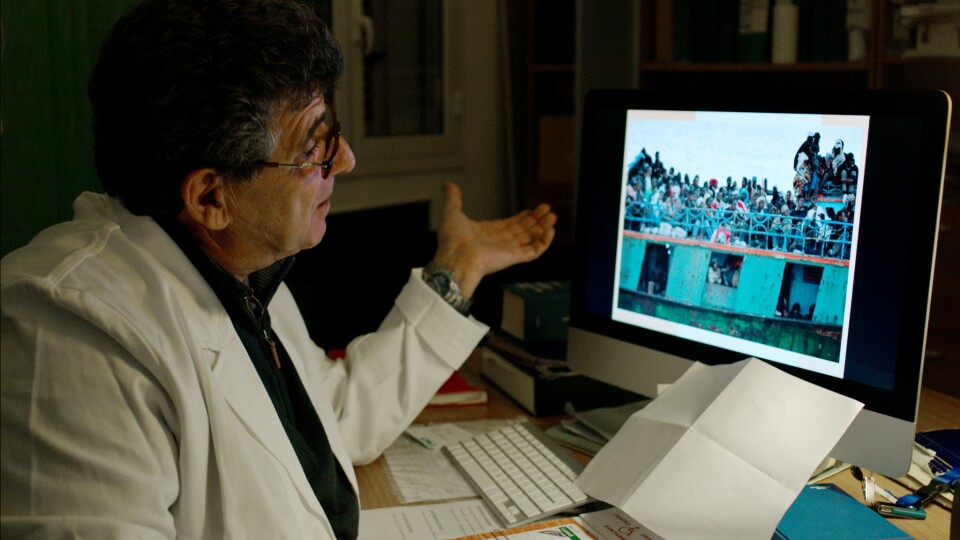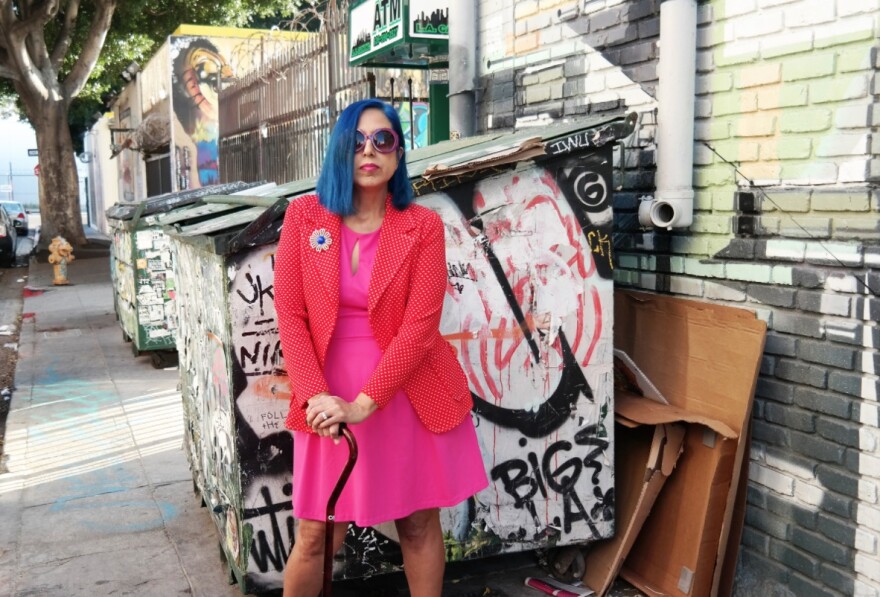Alice Armendariz, aka Alice Bag, became part of L.A.'s punk scene in the late '70s and she's still keeping that spirit alive; members of SAG-AFTRA want a share of revenue from the lucrative video game industry; Gianfranco Rosi’s “Fire At Sea” is about African migrants risking their lives in the Mediterranean.
'Fire At Sea' director: 'It was my duty to film death'
The immigrant crisis in Europe is often seen in news stories as centering around Greece, where Syrian migrants have journeyed to flee violence in their homeland.
But for years, African migrants have tried to escape their own sorrows by way of the Italian island called Lampedusa. It’s partway across the Mediterranean Sea between Sicily, Libya and Tunisia. Gianfranco Rosi’s documentary about those migrants, “Fire At Sea,” won The Golden Bear at the Berlin Film Festival earlier this year and is Italy’s submission for the Academy Award in the foreign film category.
The film is a portrait of Lampedusa, its people and the migrants who often die en route there. The Frame’s John Horn met with Rosi at the Telluride Film Festival in early September, following the movie’s North American premiere.
Interview Highlights:
On his poetic, observational style of storytelling:
I remember my teacher at NYU was always telling me, Don't ask questions [in your films]. You have 10 questions and you have 10 answers and it's not interesting enough. You have to be able to grab something deeper than that. For me, you always talk about the truth in documentaries. The truth for me is to be able to grab the reality of the people that I'm filming and to be as close as possible to their own essence, or to what I perceive being their own essence.
On coping with seeing immigrants die at sea:
The moment I encountered death in the middle of sea, on the border of Europe, I felt that somehow everything broke inside of me and I couldn't [begin] filming again. Something was completely severed. The emotion inside was completely gone. Some people said, You cannot film death. And I said, I had to film death. I don't want to be put in that situation, but I think it was my duty to film death.

On how spending 20 days on a military boat helped him film a sinking migrant ship:
These 20 days were very important to know the whole crew, which was 80 people, and the commander, who was an incredible person — a really fantastic man. So I had to spend time everyday with them. There was nothing else to shoot but the boat itself, but I wanted this boat to [seem] empty. So I was able to portray all of this and somehow also able to create a strong relationship with the whole crew. When I had to take out the camera and film the tragedy, I didn't feel ashamed to do that. I had the support of all of them. If I had gone immediately to filming, I would have felt like a total idiot: There are people there risking their lives to save other people and you are there filming?
The commander of the ship, he told me at a certain point, Did you see what happened [below deck of] that boat? I said, I heard, but I didn't go under. He said, It's your duty to show that to the world. You have to go under there and film. So I went down there. And believe me, to put your camera where there are 50 people in a pile of humans, you don't know anymore where is the leg, where is the arm, where is the head... Him trusting me and saying, Go there. I know you're going to do a good job filming and the world has to see that. I had some kind of strength that was being given to me in order to make this film.
SAG voice actors challenge video game producers for residual compensation
The voiceover actors who work in the video game industry are now on strike against 11 companies, including the biggest names in the field.
Negotiations broke down after almost two years between the companies and the Screen Actors Guild-American Federation of Television and Radio Arts, the union known as SAG-AFTRA. As is often the case with labor disputes, the issue at hand is compensation.
To sort through the strike and get a peek into that industry, we called Sarah Needleman, a writer with the Wall Street Journal. She explained the reason behind the work stoppage.
The union is asking for actors to receive additional pay, on top of the industry standard, that would be based on the portion of revenue that comes from game sales. The more popular games, the more money they would make.
Needleman said actors get paid a minimum of $825 for a four-hour session. But when they are acting or reading parts for a session, they don't always know if they're reading for a low-budget game or a huge franchise like "Call of Duty."
If they knew this ahead of time, the argument is that they would be able to negotiate a better baseline salary, above that $825 minimum.
The union is arguing for more transparency regarding the roles its members perform, but it's not certain if gaming companies will comply, given the strict culture of secrecy surrounding their products. But, she says companies have shown a willingness to be accommodating on some fronts.
One of the proposals that the union has made, that the video game companies have been pretty supportive of, is additional efforts to protect their voices. They certainly are an instrument and if you're screaming [as part of a role] ... you can imagine that [after] having to do that for a couple of hours, you can barely talk.
All in all, Needleman says it might be too soon to tell if the strike will have much of an effect, given that games can often take several years to be completed.
It's not expected to have an immediate impact. The games that are coming out in the next few months for the holidays, those are completely done and will not be impacted. This could be something that consumers hear about more in the future [if the strike is prolonged].
Alice Bag: Challenging patriarchy through punk from the 1970s to today
In the late 1970s, at the height of L.A.'s punk scene, a teenage Chicana from East L.A. named Alicia Armandariz found her voice in the burgeoning punk scene of Los Angeles. She became known as Alice Bag, fronting a band called The Bags with her powerful, in-your-face vocals.
Initially some people thought I was really angry or that I was going to beat them up or something. Someone reviewed a show of The Bags and compared me to a Babylonian Gorgon who could turn people to stone just by looking at them — like Medusa.
Naturally, The Bags wrote a song called "Babylonian Gorgon." When Alice Bag (now Alice Velasquez) was interviewed on The Frame by NPR's Mandalit del Barco, she said a grade school music teacher validated her singing as a kid, and even had her do voices for a bilingual cartoon. But punk was where she would find her community. Alice Bag was featured in the 1981 documentary, "Decline of Western Civilization," along with other L.A. punk icons such as Black Flag and X.

She said her punk singing style evolved from growing up in "an abusive household, so I had rage that was probably coming out subconsciously. So I think I had a very assertive and in-your-face type of delivery that was associated with my performances."
The Bags had a signature look too. They'd wear paper bags over their heads with cut-out holes for their eyes and mouths. The idea came from the band's bassist after they attended a local punk show where a diverse group of bands played including The Weirdos, The Germs and The Zeroes. Bag says at that show she saw that anything and anybody was welcome.
It just had so much diversity on the stage. It had women ... Chicanos ... people from all these different backgrounds and they were all playing this new punk music in very different ways.
Now, Alice Bag has a new solo self-titled album. It's her first in 40 years. It includes songs about immigration, rape and in the song, "He's So Sorry," she sings about domestic violence in a sort of 1950's girl-group style with fellow L.A. musician Lysa Flores.
On how punk gave her power:
Once I got involved with punk I was really shaped by it ... and it was that feeling of power that I never felt before. I was in a household where my father basically made all the decisions and the rest of us just had to go along. And I've always felt the oppressive feeling from situations that reinforce patriarchal values. My biggest moments of happiness would happen when someone — especially a woman — would challenge my father's authority. And in punk, I found my voice. I was able to get on stage and have a group of people listening to what I [was] saying, moving with me, feeling a connection with an audience. That's a huge sense of power.
On how she's still punk rock:
Punk rock, as I define it, has more to do with being creative, being inventive in the way that you change the world and the way you challenge whatever needs to be changed. And having that feeling of empowerment, feeling like, I may not have the tools, I may not have the resources, but I'm going to figure out a way to make my voice heard and to organize my community and mold the world to what I want to see.
Alice Bag will perform at Self-Help Graphics & Art for its annual Día de los Muertos celebration on Nov. 2.




